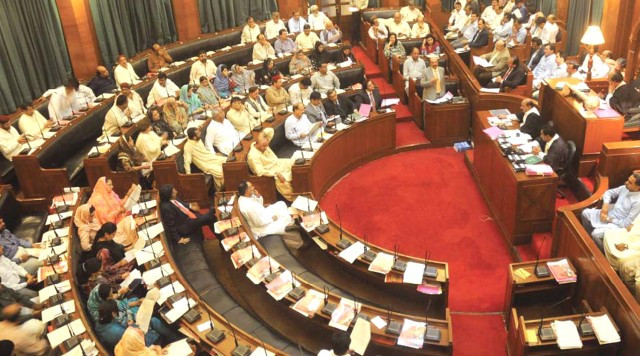Coalition partners debate permanent jobs for staff
Sindh government backtracks on “promise” to table bill to hire them in the Sindh Assembly.

The session started with Speaker Nisar Ahmed Khuhro in chair at around 10:30 am. After some discussion, mostly on wildlife, members of the government and its coalition partner the Muttahida Qaumi Movement (MQM) got into an argument. Nusrat Saher Abbasi of the Pakistan Muslim League-Functional opened fire: she raised the issue of the employees referring to her previous adjournment motion. “When I filed the adjournment motion, the law minister assured us that the matter will be resolved,” she said. “Can the chief minister assure us that they will be regularised?”
That is when the assembly resonated with argument and rebuttal. Chief Minister Qaim Ali Shah said they had not promised to table a law during this session and since the Supreme Court had given a judgment against contract employment, the government cannot afford to absorb them as permanent staff. In reaction, a visibly agitated MQM’s Sardar Ahmed described the government’s stand as a “breach of trust”. The chief minister and his cabinet had assured Ahmed and Farooq Sattar that they would resolve the matter by bringing a bill, he contended.
In the government’s defence, the chief minister said there are around 0.1 million contractual employees in the province who will also then demand permanent jobs. “If these people want to continue with their jobs, they will have to follow the rules and sit the exams.” I will request our friends not to politicise the issue, Shah added.
Sardar Ahmed recalled how the issue was resolved on Saturday. “When we approached the employees to end their protest [outside the Karachi Press Club], they said the lower staff of Punjab’s education department had been regularised. When we conveyed this to the chief minister and his team, the government said the employees must prove the Punjab government’s decision.”
Later the employees handed over faxes of the Punjab’s orders to the government’s negotiating team, after which they unanimously agreed to table a bill in Monday’s session and “an initial draft was prepared”, he said. “The government should not withdraw from its promise because we have said we will join their protest if they are not regularised,” Ahmed warned.
Meanwhile, law minister Ayza Soomro rebutted that it would have been better if the previous government had appointed the employees as permanent staff. The present government was already suffering from financial constraints and the appointment of the 7,000 employees will add to the crunch. “Let us check our resources before making the decision. But we are against contract employment,” he reiterated.
Amid all the commotion, members of the opposition and treasury were thumping their desks at the speeches of their leaders who were reading excerpts from their respective manifestos to highlight their stance about the issue. Interestingly, the manifestos were quite similar.
Education Minister Pir Mazharul Haq stood up to intervene. “As the head of the education department, I am the competent authority to make any decision,” he said. “I was out of the city [during the protests] but the chief minister telephoned me. I told him that we have to follow the rules and procedures. We have to review the situation — whether the appointments are genuine are not — because there are reports that many criminals have been given jobs.” Tabling a bill would be against the rules, he added.
“Then why did the PPP regularise contractual doctors in their first government?” retorted Sardar Ahmed. The chief minister responded, “We have learned a lesson from it because the government suffered a lot. We now have given up the policy to hire employees on contract.”
The claim of the chief minister was surprising as many retired bureaucrats are still working at high posts of the Sindh government — on contract - despite Supreme Court orders.
Before concluding the session, the Speaker suggested that the members form a committee to come up with a solution. Later, Pir Mazharul Haq, finance minister Murad Ali Shah, Sardar Ahmed and MQM MNA Raza Haroon were tasked with the job. The committee was given one week to draft a proposal. The Speaker adjourned the session till today (Tuesday).
Sindh Protection and Prohibition of Amenity Plots Bill
The Sindh Assembly deferred the Sindh Protection and Prohibition of Amenity Plots Bill till the next session. When the Speaker asked the law minister to move the motion, The law minister glanced at Sardar Ahmed, smiled and asked the Speaker to defer the motion.
Officials say the bill has been pending in the Assembly since 2009 due to differences between both the coalition partners.
Published in The Express Tribune, February 22nd, 2011.


















COMMENTS
Comments are moderated and generally will be posted if they are on-topic and not abusive.
For more information, please see our Comments FAQ